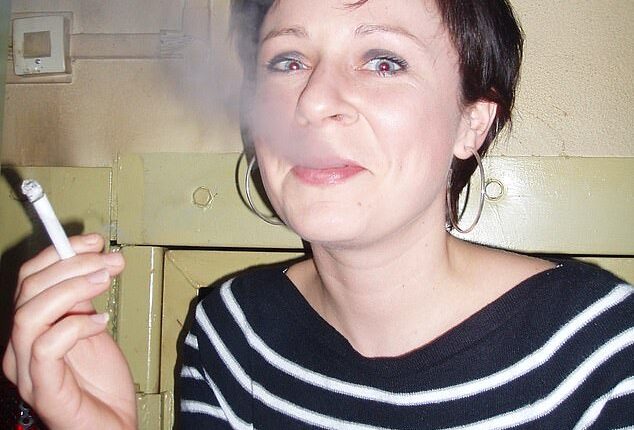Lucy Rocca’s relationship with alcohol developed in much the same way as many British teenagers.
In her early teens, Lucy and her pals would steal wine from their parents and take it to the school grounds where they congregated after hours.
They’d crack open a bottle or two and pass the booze round as they smoked cigarettes which, while taboo, was a reality for many adolescents in the late 1980s.
‘It was just completely normalised,’ Lucy, who grew up in a middle class suburb of Sheffield, recalled. ‘I never thought there was anything wrong with it.’
The mother-of-two, now 49, who did well at school and would eventually go on to study law, continued drinking throughout her teens and well into her twenties but, as a self-confessed party girl, she didn’t think it was an issue.
When she became pregnant at 22, Lucy calmed down and stopped drinking completely.
But, while she abstained from alcohol while she was breastfeeding, Lucy was back to her old ways soon after she stopped nursing.
‘It was a bottle of wine most nights with my husband,’ she said.

Lucy Rocca (pictured) started drinking alcohol at 13. She continued throughout her teens and into her twenties, before it ramped up at the age of 27

A newly sober Lucy (pictured circa 2012) with one of her daughters
‘But I didn’t feel then that I had a dependency on it. I never felt like I was using alcohol to self-medicate – which, now, when I look back, I can see that I really was.’
Although she drank ‘consistently at home every night’, Lucy didn’t consider that she had a problem with alcohol because she didn’t consume it during the day and never drove while under the influence.
She recalls the days of the 1990s when a narrative developed that red wine was ‘good for you’ – which led drinkers to indulge in their favourite vice totally guilt-free.
‘We were buying really nice bottles of red wine and having one between us every night, thinking it was really grown up and sophisticated,’ she recalled.
Everything changed, however, when Lucy’s marriage broke down unexpectedly after four years.
‘It was when my husband left when I was 27 that I just really hit self-destruct,’ she added.
‘I started drinking a bottle of wine every night on my own after my daughter had gone to bed. I’d started then to kind of lean on it as a crutch.’
Left ‘totally floored’ when her husband ‘just walked out one day,’ Lucy now sees that she ‘didn’t have any coping mechanisms’ at that time.

Lucy, 49, described feeling so much healthier and happier after quitting alcohol
‘I certainly had no awareness of the impact it was having on my mental health,’ she said.
As Lucy’s drinking escalated, she found herself in situations that were no longer simply ‘hedonistic,’ but outright dangerous, eventually ending up in hospital.
When reflecting on all the times her drinking drove her into harm’s way, she said: ‘There are too many.’
One of the worst episodes was when Lucy went to see the Red Hot Chili Peppers perform in London’s Hyde Park in the early 2000s.
‘I’d gone with my boyfriend and got really, really drunk, and I’d lost him,’ Lucy said.
‘Then I woke up under a tree at midnight and the whole of Hyde Park was emptying out.
‘I’d lost my purse, my phone, my boyfriend. Two policemen were stood over me and I just couldn’t remember anything.
‘The whole night had gone.’

Even when Lucy was drinking nightly between the ages of 27 and 35, she never saw her drinking as a problem
After this ‘catastrophic’ experience, Lucy went into detox mode, abstaining from alcohol altogether and prioritising exercise- something that became a regular pattern before she eventually picked up a drink again, only for the cycle to repeat itself.
‘I would just stop for about six weeks,’ she explained. ‘I would go on a detox.
A keen runner and frequent gymgoer, she’d ‘ramp up the exercise and drink loads of healthy smoothies.’
But, by the time she’d gone a significant period without alcohol – whether a month or six weeks – she’d say to herself: ‘Well, I’ve done a month now, so it’s fine – I obviously haven’t got a problem.’
For the next six years, Lucy continued in a pattern of drinking heavily before going teetotal for a few weeks.
During this time, neither friends nor family challenged her habits, partly because they all enjoyed a drink too. ‘they were all heavy drinkers.’
‘When I had those nights [where I blacked out], people would just kind of think, “Oh, she’s had one too many. She’s taking it a bit far.”
‘Given the cultural context [of the 1990s and early 2000s] that I was drinking in, it wasn’t seen as this horrific thing.’

Lucy was a teenager in the late ’80s and early ’90s, and was a self-confessed party girl
In a similar way, Lucy would never have called herself an alcoholic.
‘I was a binge drinker and I just quite frequently got drunk without meaning to.
‘I would go out and think, “I’m just going to have two,” and then I’d end up getting really drunk and fall over, and friends would have to get me home in a taxi.
‘Nobody ever challenged me. Nobody, whether family or friends, ever said: “I think you’ve got a massive problem with alcohol.”‘
While Lucy remembers having a ‘kind of gut feeling’ that her drinking ‘wasn’t very healthy,’ it was taking place in a climate of ‘normalised binge drinking.’
In 2010, Lucy had completed her law degree but had failed to get a training contract with a law firm.
Having spent all her savings on going back to university, she was feeling ‘very low’ and wasn’t sure what to do next.
Her drinking ramped up until one night she ended up having three bottles of wine in one go.

When she went out drinking with friends, they would often have to send her home in a taxi because she was so drunk
‘My daughter was at her dad’s again and I drank three bottles of wine, which was huge – a lot for me, even,’ she recalled.
Rather than going to bed, Lucy decided to take her dog out for a late night walk at 10pm.
Yet, she was so drunk that she didn’t make it home, instead collapsing on the street.
Unconscious and surrounded by vomit, Lucy could easily have been hit by a car as the panicked pooch ran around in the middle of the road.
Fortunately, a friend was driving past at that time and, having spotted Lucy, called an ambulance.
She said: ‘I woke up in Sheffield General Hospital at about three o’clock in the morning.
‘It was just an absolutely massive wake-up call.’
While Lucy was sent home from hospital relatively quickly, that experience proved to be a real turning point for her.

A newly sober Lucy pictured with one of her daughters
She explained: ‘I just thought, “That’s it, I’m done.” I was terrified of drinking because of what had happened on that night.
‘Waking up in hospital was truly the most horrendous thing. I was so ashamed and it just rocked me to the core.
‘I just couldn’t have contemplated drinking again after that.’
Lucy’s fear of alcohol got her through ‘a good 18 months [of sobriety]’, but it wasn’t always plain sailing.
While alcohol was off the cards – Lucy never drank again after that awful near miss in April 2011 – she had to learn to ‘live without that crutch.’
‘I suppose there were emotional issues that I had to confront,’ she said.
Lucy’s progress during this period kept her sober even when she reached the point where she thought to herself: ‘I wonder if I could drink again?’
‘About 18 months had passed and I’d realised I was so much happier.

Lucy got sober in 2011 and recently celebrated 14 years of sobriety
‘My mental health problems had all gone. I was a better mum, I had a better life and I was starting to just feel happy again.
‘There was just no way that I would have gone back to it because it was literally night and day between the drinking days [and what came after].
‘My life had just completely changed.’
But Lucy’s sober journey doesn’t end there. In November 2012, she launched Soberistas – an online ‘community of non-judgmental people, helping one another to kick the booze and stay sober.’
While Lucy had attended a charity called Sheffield Alcohol Support Service in the aftermath of her hospitalisation, she found that ‘it didn’t speak’ to her at all.
‘There were posters on the wall about needle exchange and it was run by ex street drinkers who were in recovery.
‘My drinking was really, really different. I’ve never drunk spirits. I’d never drink in the day. I’ve never been involved with the social services.
‘It was all party drinking, really, that just got slightly out of hand, and I felt like a fraud.

Lucy never had another alcoholic drink after passing out in the middle of a road late one night and waking up in hospital
‘I was drinking a bottle of Chardonnay every night and I was in a room with people who’d been drinking a litre of vodka every day. It was just completely different.’
Lucy felt similarly ill at ease at Alcoholics Anonymous (AA), largely because of the way that members are encouraged to label themselves as alcoholics and the organisation’s ‘one day at a time’ approach.
‘I thought, actually, I don’t want to call myself an alcoholic and think I’m in recovery for the rest of my life,’ she explained.
‘I’d rather see it as a choice and something positive that I’m doing myself because that just feels a lot more motivational than labeling myself and doing it one day at a time through gritted teeth.
‘I didn’t think I was an alcoholic because I wasn’t physically addicted to alcohol and I just didn’t like that word.’
Lucy, who prefers to use the term ‘alcohol use disorder’, was sure that AA was never going to work for her – but she still wanted to be part of a community.
Soberistas, then, was born out of her sense that she had no where to go – and her strong belief that there must be others who felt the same way.
‘I just remember having a very clear, sudden idea that it was really necessary to have an online space where people could just be open about their drink issues with people who understood and wouldn’t judge them,’ Lucy said.

She now enjoys soft drinks and mocktails when she goes out
‘It seemed like there was this massive gap. It just wasn’t there and it needed to be.
‘I felt quite angry about the way that people who have realised that they want to stop drinking have to pigeonhole themselves and call themselves an alcoholic and go to AA.
‘What if that doesn’t appeal to you? I want to see [getting and staying sober] as a positive thing and I want it to be an aspirational lifestyle choice.
‘I don’t want it to be a thing that I beat myself with for the rest of my life.’
Lucy leapt into action, calling on her then-boyfriend to help her set up a website.
‘It just took off,’ Lucy recalled. ‘I contacted Alistair Campbell when I was trying to get the word out there and he asked if I wanted to post a blog on his blog.’
Lucy’s post was picked up by the press and, as a result, Soberistas ‘just snowballed’, with 20,000 people signing up in the first year.
Reflecting on the organisation’s early success, Lucy said: ‘I think there’s this hidden demographic, this hidden group of women, mostly aged between 40 and 65, who really felt like they had this problem [with alcohol] but that they weren’t quite bad enough for AA or rehab.

Lucy runs the online community and charity Soberistas, providing support for people with alcohol issues
‘But they didn’t know where else to go, so they just carried on drinking in secret.’
Today, with 70,000 people registered and 5,000 subscribers, Soberistas runs chat rooms where people can post about their issues with alcohol, as well as smaller groups where people are accountable to each other.
‘It’s mostly the anonymity of it that appeals,’ Lucy said.
‘You can be completely anonymous and connect with people who’ll support you in your efforts to stay sober.’
Lucy herself is sure that Soberistas and the support the community provides has been invaluable during her 14 years of sobriety.
‘It’s just a really nice, non-judgmental space – and that works for me.
‘I think one of the biggest things I wanted to to achieve with Soberistas was having somewhere that was free from judgement.
‘I felt this kind of hypocrisy in society, with people judging those with alcohol issues.

Lucy, who founded Soberistas in 2012, is convinced that the organisation plays an important role for those with problems with alcohol
‘One of the biggest problems that stopped people getting sober was that they were just too ashamed to talk about it – so they carried on drinking.’
Having become a charity in 2023, Soberistas has grown into Lucy’s fulltime job.
And, while it can be a lot of work, especially with the charity management element, she’s motivated by the knowledge that it’s given countless people like herself a lifeline.
‘It was definitely needed,’ she said confidently.









